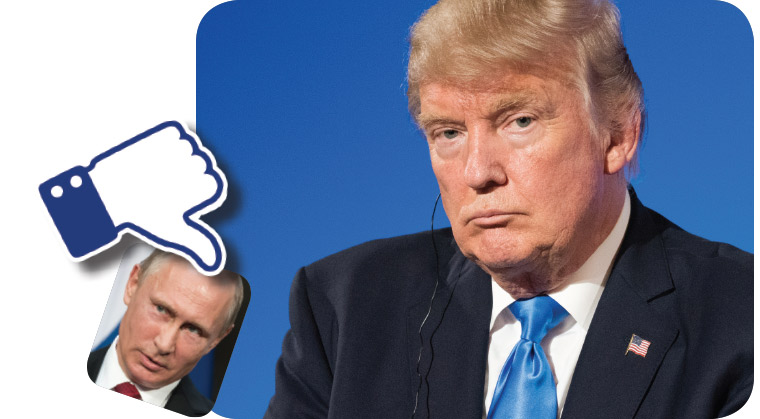Trump Unlikes Putin

Trump finally stands up to Putin in barrage of missiles over Syria

P
resident Donald Trump’s decision to attack Syria last weekend sent a message not only to the Syrian people, the Assad regime, and the international community — but also to the American people: Trump is unafraid to challenge Russian president Vladimir Putin.
From the start of his presidential campaign, Trump gave the distinct impression that he admired Putin, although it’s not clear exactly why. People close to the president say that while other administrations failed time and again to get Russia relations back on track (remember Hillary Clinton’s awkward gift of a “reset button” to a clearly amused Russian foreign minister Sergei Lavrov?), Trump wanted to use out-of-the-box thinking to mend ties with Russia, from which the US stands to gain plenty.
Critics claimed that at the end of the day, Putin heads an authoritarian regime, and no matter how you slice it, Russia is an adversarial state. (When Mitt Romney made the same charge in a 2012 debate, many of these same critics cheered Obama’s response, “The 1980s called — they want their foreign policy back.”) Therefore, they conclude, Trump is acting out of adulation for Putin in the best case, and in the worst case, out of fear of him.
Although Trump is on record having used tough language about Russia in the past — in 2014 he said Romney was right that Russia is “our biggest problem” — he has reserved his harshest rhetoric for Obama, saying his predecessor’s weakness only encouraged Putin’s aggressiveness. Even when the Russians were clearly acting in defiance of American interests, Trump blamed Obama for bringing relations down to such a low point.
At the end of last month, US-Russia ties began to spiral into a decidedly downward trajectory. The poisoning of Russian spy Sergei Skripal in London elicited a strong condemnation from the White House, followed by the shuttering of the Russian consulate in Seattle and the expulsion of 60 diplomats. On April 6, sanctions were levied against 24 Russian citizens, including oligarchs close to Putin, as well as another 14 organizations and companies in Russia. And on Sunday UN ambassador Nikki Haley announced new sanctions targeting Russian companies doing business with Assad.
Trump’s change of heart was triggered partly by pressure brought to bear by Congress. But the impression is that Trump finally got that in the current global reality, Putin is anything but an asset — both at home, among the American public, and all the more so, among the Western powers, and that he no longer stands to gain from being nice to Putin.
Inasmuch as Trump wanted to show Putin who’s boss, last weekend’s attack was limited, carefully calculated not to trigger a military conflagration with Moscow. Consequently, the bombed sites were empty and not a single Russian soldier was hurt. Of course, considering that the Obama administration had demurred from bombing Syria on the grounds that Assad’s air defenses were “too tough,” the attack probably put the red back in the “red line.”
Aside from the missiles, Trump also unleashed a direct verbal attack against Russia, saying that Putin had not kept his promise to prevent Assad from accessing chemical weapons, and added, “What kind of regime wants to be associated with the mass murder of innocent men, women, and children?”
In all probability, the US will not launch a repeat operation in Syria. There’s a lot to be said about the strategy behind the attack, why the murder of civilians with chemical weapons is a “red line,” whereas killing with conventional weapons is not something that warrants an American response.
As far as Putin is concerned, at least, the message is crystal clear that he has now become persona non grata.
(Excerpted from Mishpacha, Issue 706)
Oops! We could not locate your form.







